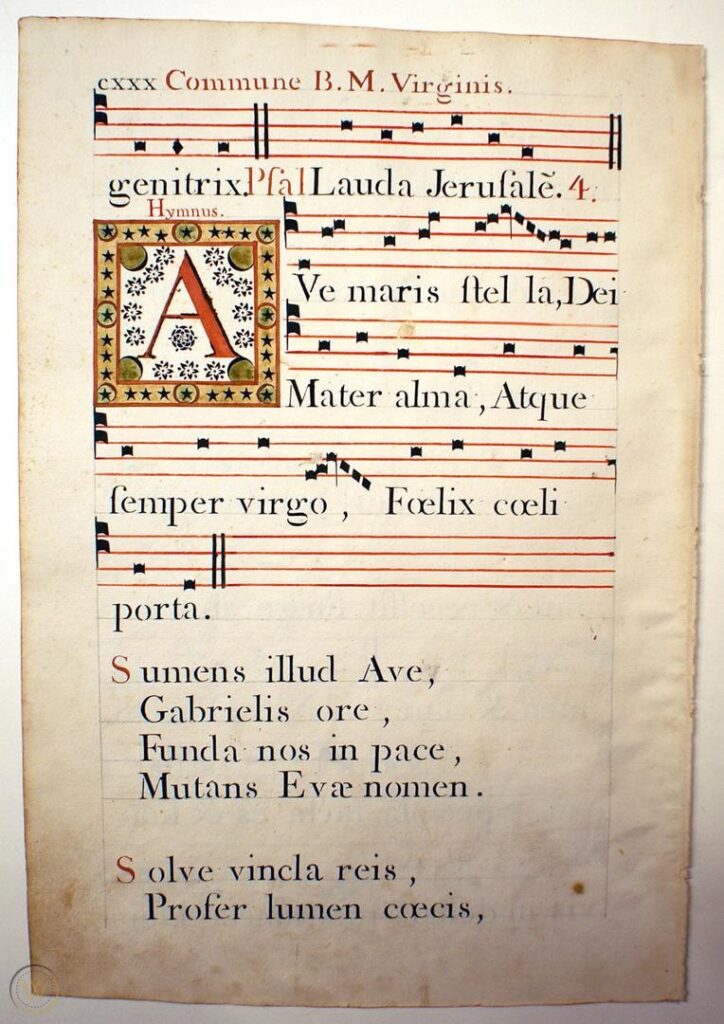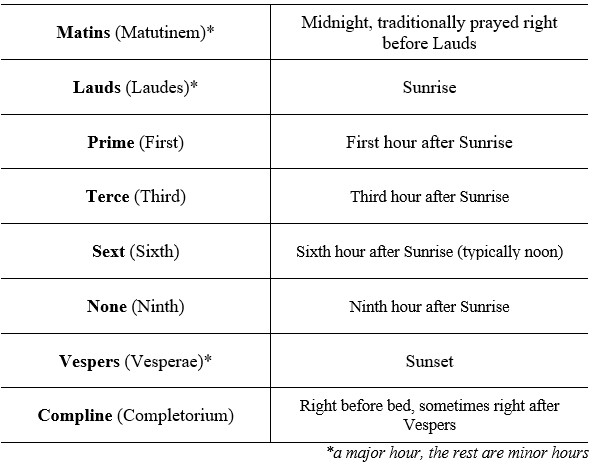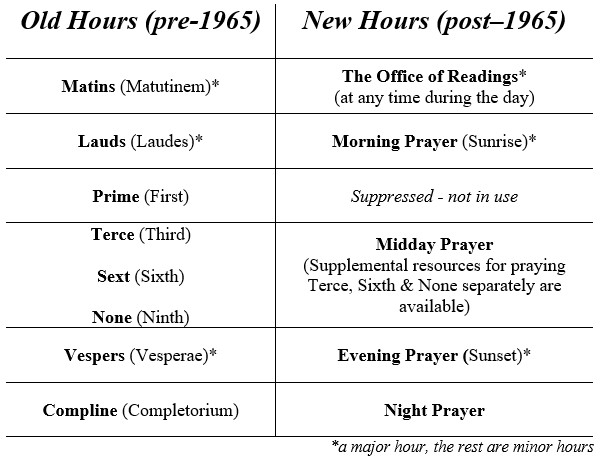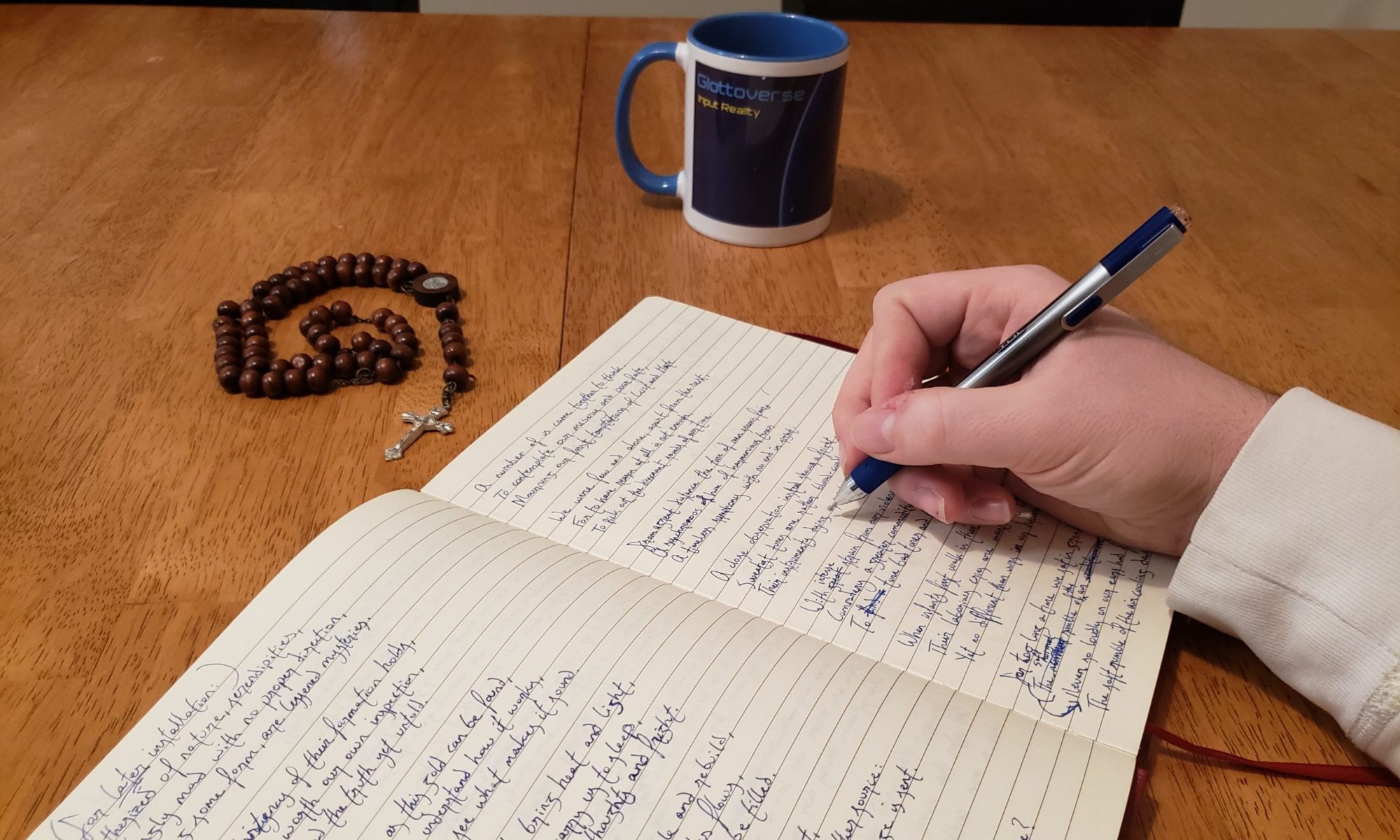
Praying the Divine Office at Home
As many churches begin phasing in the use of Propers during Mass, some may still use hymns, but if many of the young voices that I sing with have our way, hymns are likely on their way out in the parochial church. But do we hate hymns? No way! There are a great stock of traditional hymns we might use. When, though, might we sing them? During the prayed hours of the Divine Office, of course!
Many Catholic families who are actively seeking to raise their children in the Catholic faith are always on the lookout for things that will draw themselves and their children deeper into the Faith. Maybe they pray a nightly family Rosary, or they engage in Liturgical Living activities as advocated by Kendra Tierney in her book The Catholic All Year Compendium, or they prioritize going to daily Mass. In any case, they want to introduce as much extra-liturgical faith-based activity as they can into their home, the domestic church. This isn’t always easy, though. Take the idea of the daily family Rosary. Many mothers and fathers are incredibly impressed by great figures such as Scott Hahn talking about the spiritual benefit that a nightly Rosary had on their family. When actually attempting it, though, they fall way short of this ideal. Maybe they get through a decade every night, maybe they do a couple Rosaries a week, or maybe they only figure out how to do it together one evening a week.
To be clear, whatever you are doing is great. One Rosary a week, I believe, still makes a drastic difference on your family’s prayer life.
If you’re like me, though, you might ask “what is the best thing that a family can do outside of going to regular Mass?”
The Other Liturgy of the Church
I shudder when people refer to the Mass as ‘(The) Liturgy,’ as if there is no other liturgy or, if there is, the Mass is somehow equated to it. What can equal the literal presence of Jesus Christ in the sacrament of the Eucharist? The truth is that “The Liturgy refers to the public and common worship of the Church, which necessarily has a repetitive nature. The Mass is, as Vatican II says, “the source and summit of the Christian life,” but is there anything else involved under this larger umbrella of ‘Liturgy’?
Yes, the Divine Office, or the Liturgy of the Hours.
Inherited from Jewish practice, and kept richly alive in the tradition of the monastics, the Church considers the Divine Office an integral part of Her liturgy. Through a period of time, all 150 psalms are recited at the various hours of the day. Some eastern traditions pray all 150 psalms every day. In The Rule of St. Benedict, he lauds this as the highest of standards. Some traditions, like the western monastic that started by St. Benedict, prays all 150 psalms over the course of a week. In anticipation of the grumblings he might hear because of the requirement to pray all 150 psalms in a week, he points to the eastern traditions and basically says ‘man up!’ and get over it. The Liturgy of the Hours which came into being after Vatican II prays all 150 psalms over the course of four weeks.
Notice, though, how I referred to the fact that this has been largely kept alive in the monastic tradition, even when the Church requires all of her clergy to pray the full Divine Office as well. That means that in the traditional Catholic family, praying the Divine Office hasn’t been high on the priority list in times past. And this makes all the sense in the world! Families are busy.
Before getting into the depths of the Office itself, I would like to highlight that this is exactly how the Rosary came into existence. St. Dominic, a monastic used to praying all 150 psalms every week, wanted a way for the laity to participate in the Church’s liturgy in some extended way. To this end there is the Rosary. Just as the Divine Office has one praying all the psalms and meditating on God’s mysteries, praying all of the mysteries of the Rosary also draws one deeper into thought on God’s mysteries. Just as there are 150 psalms, the Rosary was originally designed so that, all mysteries prayed, 150 Hail Marys are said. So if you take nothing else away from this article, and you already pray a daily Rosary, know that you are still participating in the Church’s liturgical prayer through St. Dominic’s pastoral provision.
“So if you take nothing else away from this article, and you already pray a daily Rosary, know that you are still participating in the Church’s liturgical prayer through St. Dominic’s pastoral provision.”
To this end I will begin by saying this: just as praying a daily or weekly or Rosary is a great spiritual goal, so any amount of the Office that you incorporate into your life is also a great spiritual goal.
The Divine Office Basics
The reason that one associates the Divine Office with the monastic tradition before even associating it with the priestly and clerical offices of the Church is because praying the full Divine Office takes work. This is why the USCCB and tradition refers to this as “God’s work”: because it is a difficult task. There are, traditionally, 8 canonical hours:

Matins, the vigil office, tends to take the most time. Fully chanted, it isn’t unreasonable that it takes a full hour to complete. Each subsequent hour can take anywhere between 15 mins and 30 mins. In other words, fully committing to praying the office, especially at first, is a huge time commitment. The monastic life, unlike Peg + Cat‘s immature definition, is not primarily about helping people while dressed in a robe. The monastic life is primarily centered on praying the Divine Office, on doing the work of God.
The meat of each hour is of course the psalmody, the psalms done each hour. After the psalmody follows readings from the Bible or from great saints, and each hour has a timely hymn. The conclusion of the hour focuses on a liturgically appropriate prayer, usually the collect, or opening prayer, from the previous Sunday’s Mass.
Speaking of Mass, it is important to note that the Divine Office, as a portion of the Church’s Liturgy as a whole, deserves a lot of the same reverence and attention that the Mass gets. Daily Mass, for example, is well abound in the western Church, but that means it is often said rather than sung. Similarly the Office is more often said quietly to oneself, rather than sung. In terms of importance, though, the Divine Office, like the Mass, deserves to be sung on every occasion. This is where I discovered the largest treasure trove of Gregorian Chant in the modern time when trying to learn how to do it. A good textual example of this repertoire is the Liber Usualis, which contains nearly all of the Church’s chant for Mass and for a large portion of the Office.
How to Add the Habit of the Office
Before discussing the how, it is probably important to mention a why. Why pray (or attempt to pray) the Divine Office instead of just a daily Rosary, or on top of the Rosary? Paragraph 100 of Sacrosanctum Concilium states that: “The laity…are encouraged to recite the divine office, either with the priests, or among themselves, or even individually.” Wrapping this conciliar document into the discussion complicates things, but let it be known as a good starting point that while the monastic tradition is what has really kept the life of the Divine Office singing, it is meant for the whole Church to pray. While the Rosary and other devotional prayers are good for the soul, is it not more fitting that the central liturgy of the Church be prioritized as a main part of the Christian’s everyday prayer?
Adding in the practice of praying the Divine Office from no prior use is going to be nearly impossible. It takes time to form effective habits, and learning the rubrics of the Office takes time, just like learning the rubrics of Mass. Once learned, of course, the motions are secondhand, just like for the Mass. It is best to begin with the major elements. Once again we invoke that conciliar document, Sacrosanctum Concilium, and how it emphasizes certain hours. Lauds and Vespers, said at sunrise and sunset, are, according to the document, the primary hours around which the Office hinges. Therefore it makes absolute sense that one praying the hours would begin by implementing these into their prayer habits. Out of the two, Vespers is probably the easiest to begin with. Instead of an evening Rosary, you instead simply pray the evening office of the Church. Out of all of the hours, these are also the ones you are most likely to pray in choir with your family at home, if you have one.
Once habits are formed around these two main hours, Compline is the next to add. In many ways, Compline is a choral favorite, and some may feel inclined to start here instead of the two major hours. It is a very special way to truly end the day, especially by candlelight and perhaps with some incense burning.
From here the daytime hours are the next to add. These will structurally be the more difficult to add in, especially depending on your job. If you are allowed to take a couple of breaks in addition to lunch, then this will be quite easy, for example. Here it is best to say “pray what you can” and to be merciful with yourself for what you may or may not do otherwise. Start with incorporating one hour into your daily work routine and only add in another once the first is comfortably set. I personally find that Sixth is the easier hour to add, since you would pray it somewhere around lunchtime. Of course if you don’t pray exactly starting the minute of the hour, that’s okay as well. If one day you start Sixth at 1230 PM, or 1130 AM, or even 130 PM, then you’re probably fine.
Lastly, and most weightily, Matins is to add. At this point if you’ve added all the other hours into your routine, then you’re well accustomed to the nature of the Divine Office, and so you won’t be bogged down with how to do the hour as much as being bogged down for the time. Now, if you’re single and have no family, then you have every reason to plan on waking up early (around 5 am, maybe) to pray it then. But, if you do have a family and/or you are bogged down with important responsibilities, then you can take advice from the Breviary’s General Norms (here in line 144) which states that, with good reason, Matins may be moved to the previous afternoon or evening, so long as it does not precede 2 p.m. I don’t know about you but I would consider kids a pretty good reason! Because Matins is the heaviest with 9 psalms and 3 readings, or maybe even 9 readings, it might show itself to be a proving grounds for your familiarity of the Office.
Which Divine Office resource to use
Now, you may have noticed so far that a lot of my references are coming from the 1960s – and there’s a bit of a caveat I have to add to everything on which I’ve just advised you. I have essentially been showing you the old way to pray the Divine Office. Why? Primarily so that you understand the fullness of the meaning of the Office from time past, but also so that when I explain the new office to you, you can see it for what it is: a simplification. This is where we see that my previous invocation of Sancrosanctum Concilium is a bit difficult, as this document is what called for the simplification of the Divine Office in the 1960s. Note the hours, for example:

There’s not a problem with praying the new Liturgy of the Hours. It is the common prayer book of the Church. But you do have to understand the old structure of the hours in order to understand what the new structure of the hours wants to achieve. Besides the restructuring of the hours, the Psalms are also spread out over the course of a 4 week cycle, meaning that there are generally less Psalms in any given hour than the old way, so it is quicker to do.
Online Resources
Whichever way you want to go, the first thing to do is to try and use some digital resources to begin praying the hours. If you can build up the discipline of praying the hours on an app then you might be more disposed to successfully purchase and use a printed version.
Divinum Officum – This website has everything laid out plainly and you just navigate to the day. Use this if you want to become familiar with the old form of the Office.
iBreviary – This website, as well as app, allows you to quickly and simply navigate what you need for the old form AND the new form of the Divine Office. This is very easy to begin navigating.
Printed Resources
After you prove to yourself that you can begin praying the Office, then you can upgrade and move on to actual printed texts.
Liturgy of the Hours – 4 Volume Set – This is for the new Office after Vatican II. Anytime you find a four volume set for the Liturgy of the Hours, this is the same set you will find. And yes, they all cost about the same. Each volume has everything you need to pray the Office at the various times of the season, and everything is listed out pretty straightforward. There is a simpler version of this, titled Christian Prayer, which has some good short term uses (like for Evening Prayer and Morning Prayer), but is not useful for praying the full office. The shorter version lacks a huge portion of the Office.
Nova et Vetera Breviary – This two volume set for the Old Divine Office is excellent. I have not seen it in person, but if I were to buy a printed version of the old Office, this is the one I would go with. The first volume is for Advent through Lent, and the second volume covers Easter through the end of the Church year. If you needed English text as well, then I would recommend checking out the Baronius Press Breviary.
Abbreviated Resources
If you ultimately do find this to be all too overwhelming, then there are some abbreviated resources that are excellent.
The Little Office of Baltimore – The Third Plenary Council of Baltimore met in 1884, and one of the fruits of this Plenary Council was the production of a smaller Office, meant for the American laity. This office, being established in 1884, follows the structure of the Old Office, but essentially makes it the same for every day. Sundays are different and certain feast days are different, but otherwise it’s a great resource for praying the office in a much smaller way. I used this to help acclimate my family to the experience of praying the Office, and since it is the same every day, my daughter has very quickly memorized whole psalms!
The Little Office of the Blessed Virgin Mary – This very old devotional prayer book follows the hours of the old Office, but attunes the psalms and readings to the Blessed Virgin. These, also, are the same every day.
Singing the Office
If you, like I, take chant and prayer seriously, then you very well may be interested in singing and chanting the Office. Here the water gets murkier, and this is a misfortune.
The Liturgy of the Hours – There are no full English chant books for the Liturgy of the Hours! And resources for the new Office are few and far between. If you know anything about chant you will know that the Abbey of Solesmes is responsible for everything we have as resources in the modern era. They are part of the whole revival of Gregorian Chant in the early 20th Century! They have since developed a set of the Antiphonale Romanum, which is a lot. While useful and effective, they specifically say that these books are not intended for the average monk, which means that though a good resource, it may not be easy to use. It is also in Latin, of course, which removes part of the accessibility of the new Liturgy of the Hours.
The Liber Usualis – This is a book containing all of the chant for the Mass as well as for Prime, Terce, Sext, None, Vespers, and Compline. It has Lauds and Matins of some special Feast days, but that is all. This book would be more specific for people who chant a lot at Mass and are also interested in singing some of the hours.
Antiphonale Monasticum (1934) – This classic volume, also composed by the Abbey of Solesmes, has all of the Divine Office prior to Vatican II except for Matins. So it is a leg up from the Liber Usualis. It is actually rather common that Matins wouldn’t be included in chant volumes, unless it is for a special feast, since Matins as the vigil hour is probably very difficult to make everyone come together and do. It is much simpler to have everyone do it by themselves and maybe only chant it with a straight tone. The Nocturnale Romanum, an elusive text that contains all of the chants for the Old Matins, has made momentary appearances in recent history, but is currently not available anywhere.
Yes, a Family can really pray the Divine Office
One of the reasons I write this article is so that anyone, especially families, might be encouraged to start praying the Divine Office. Just like I encouraged the good use of praying a daily or weekly Rosary at the beginning of the article, I wish to emphasize again that whatever you include from the Divine Office in your life will be of great benefit. Sancrosanctum Concilium, in that same paragraph 100, states that “Pastors of souls should see to it that the chief hours, especially Vespers, are celebrated in common in church on Sundays and the more solemn feasts,” meaning that the Council envisioned that even a once a week celebration of Vespers by a parochial community would add great spiritual benefit to their lives. Imagine that you and your family prayed Vespers every night, then, compared to that original goal!
As a father myself, though, I already know the excuses:
“We just have too busy a family schedule.”
“Nobody else is interested in it.”
“The kids won’t sit still!”
“I don’t know enough Latin.”
“The kids won’t understand what is going on.”
“It’s too much for me to learn.”
The great news here is that as laity, we are not required to pray the Divine Office. Our participation whatsoever in this liturgical prayer is a great blessing to ourselves and to the Church, and does great honor to God. If you only pray one or two of the hours as a family, and then pray the rest individually, or if the only hour prayed is one of the hours as a family, then, just like the daily or weekly Rosary, these are great victories and wonderful prayerful acts to be celebrated. Not to mention, this is why those abbreviated versions of the Office exist!
This being said, I want to echo what I heard Matt Fradd say recently when commenting on pulling himself away from constant modern cell phone usage: “How much are you willing to sacrifice?” in order to live a more prayerful and peaceful life? Are those excuses above really true? Or is there something else going on that you really want to spend more time doing, like scrolling through your phone, watching youtube videos go leor, staying caught up with a tv show, or being involved with sports or other leisure activities?
As families and even single people, we are always busy. I think of all the retired people I know, who are somehow busier now than they ever were when they were still working. We’re always going to have excuses to not dig in deeper and give our time to God. In my own family I have already seen this fruit. While I pray the more full Divine Office by myself, we use the Little Office of Baltimore as a family – my daughter has multiple psalms and the Magnificat already memorized, and she’s FOUR. If you, like my family and I, really want to turn away from the world and look more directly to God, then this is the way to do it. Plug into the fullness of the liturgy of the Church, and do the Opus Dei (the work of God) in the Divine Office.
Bullet list of tips to pray the Divine Office with family:
-
- Revisit the order of introducing the hours into your daily routine that I mentioned at the beginning. It may take a year or longer to really get into the swing of the full office, if not a good amount of it!
- Don’t pressure other members to do more than they’re able.
- Allow kids a little wandering freedom (but keep them close!).
- Provide kids with a tactile focus (Rosary beads, a book of their own, a religious image book).
- Singing is way better than just reading – even if you want to adopt just one of the eight simple Gregorian Tones for the whole of the Office.
- Allow yourself to feel a little confused at first. Eventually the habit will build itself. You’ll know you’re there when you’re kids start spontaneously singing and saying parts of the office on their own!

